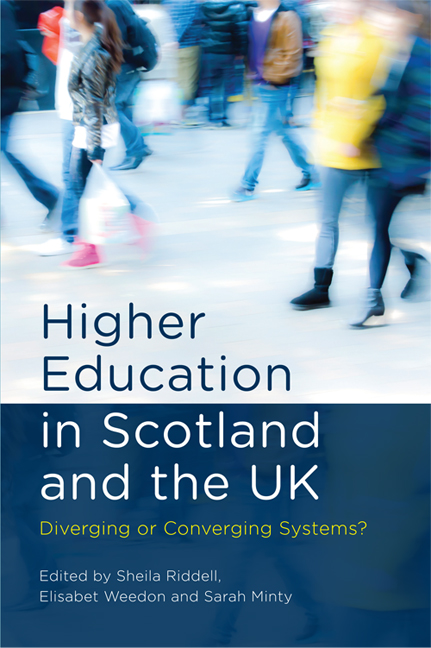Book contents
- Frontmatter
- Contents
- Figures
- Tables
- Acknowledgement
- The Contributors
- Dedication
- 1 Scottish Higher Education and Devolution
- 2 Higher Education Governance and Institutional Autonomy in the Post-devolution UK
- 3 Student Funding in the UK: Post-Devolution Scotland in a UK Context
- 4 Young People–s Attitudes towards Student Debt in Scotland and England
- 5 Cross-border Flows of Students within the UK
- 6 Widening Access to Higher Education in Scotland, the UK and Europe
- 7 The Internationalisation of Higher Education in Scotland and the UK
- 8 Research Policy in Scotland and the Rest of the UK
- 9 Devolution and Higher Education Policy: Negotiating UK and International Boundaries
- Appendix 1 Research Methods
- Appendix 2 List of Acronyms
- Index
1 - Scottish Higher Education and Devolution
Published online by Cambridge University Press: 05 August 2016
- Frontmatter
- Contents
- Figures
- Tables
- Acknowledgement
- The Contributors
- Dedication
- 1 Scottish Higher Education and Devolution
- 2 Higher Education Governance and Institutional Autonomy in the Post-devolution UK
- 3 Student Funding in the UK: Post-Devolution Scotland in a UK Context
- 4 Young People–s Attitudes towards Student Debt in Scotland and England
- 5 Cross-border Flows of Students within the UK
- 6 Widening Access to Higher Education in Scotland, the UK and Europe
- 7 The Internationalisation of Higher Education in Scotland and the UK
- 8 Research Policy in Scotland and the Rest of the UK
- 9 Devolution and Higher Education Policy: Negotiating UK and International Boundaries
- Appendix 1 Research Methods
- Appendix 2 List of Acronyms
- Index
Summary
INTRODUCTION
This book focuses on the challenges and opportunities faced by Scottish higher education following the outcome of the referendum on independence in September 2014. Whilst 55 per cent of votes cast were in favour of remaining within the UK, a significant minority of the electorate voted for independence, leading to a general endorsement of the idea that further devolution was needed. The precise nature and scale of future constitutional change, and how this will impact on higher education in Scotland and the rest of the UK, is unclear at the time of writing. However, a central theme of this book is to track the ebb and flow of policy convergence and divergence across a range of domains such as tuition fees, widening access and internationalisation. Throughout the book, comparisons are drawn with higher education systems in other parts of the UK and, where relevant, Europe and the developed world. The book considers whether we are witnessing the demise of a common UK higher education system and the emergence of a new system in Scotland, based on different social values and reflecting wider social policy drift across the UK.
This question is important not just for political reasons, but also because Scottish universities make up an essential element of the country's economic infrastructure (Universities Scotland, 2010). According to Universities Scotland in its submission to the Smith Commission, universities contribute £6.7 billion in gross value added to the Scottish economy (Universities Scotland, 2014). This implies that every £1 of public investment leads to £6 of economic impact. Whilst these numbers may be disputed, it is evident that much employment in Scotland depends on the higher education infrastructure either directly or indirectly; universities employ over 39,300 people and support over 142,000 jobs in areas such as catering, rentals, construction and so on. At the same time, as is evident in recent policy discourse, Scotland's higher education system plays a major role in the formation of national identity and the assertion of difference from systems operating in the rest of the UK, particularly England.
- Type
- Chapter
- Information
- Higher Education in Scotland and the UKDiverging or Converging Systems?, pp. 1 - 18Publisher: Edinburgh University PressPrint publication year: 2015



